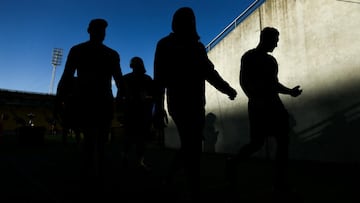Athletes face career-ending situation, says World Players executive
World Players Association executive director Brendan Schwab spoke to Stats Perform about how coronavirus is impacting athletes.

Athletes are at risk of having their careers cut short if soon-to-be free agents face a prolonged period of unemployment due to the coronavirus pandemic, warned World Players Association executive director Brendan Schwab.
COVID-19 has brought sport to a standstill across the globe, with the 2020 Olympic Games, major European football leagues, the NBA, MLB and NHL postponed.
Euro 2020 and Copa America 2020 have been pushed back to next year amid the fight to combat the spread of the virus, which has claimed more than 21,290 lives.
It remains to be seen when and if the 2019-20 Premier League, LaLiga, Serie A, Bundesliga and Ligue 1 seasons will resume, raising doubts over the futures of football players – whose contracts are due to expire in June.
The likes of Edinson Cavani and Thiago Silva (both Paris Saint-Germain), Willian (Chelsea) and Dries Mertens (Napoli) are all set to become free agents.
Schwab: "Challenge is to ensure enough liquidity"
As clubs and organisations try to reduce costs amid the economic crisis, Schwab – who works for World Players, which brings together 85,000 players across professional sports through more than 100 player associations in over 60 countries – told Stats Perform: "The challenge is to ensure enough liquidity during the shutdown so that the same content can be delivered to fans, broadcasters and brands but over a longer period.
"Existing contracts and regulations such as contract expiry dates and transfer windows will all need to be reformulated which can only be done though collective decision-making involving governments, sports bodies, broadcasters, stadia operators, player unions and civil society. The impact on the sporting schedule will be long-lasting and may take several years to return to normal.
"Seasons just starting – such as MLB, AFL and NRL – have a longer struggle in many ways. Shortened seasons are likely, but it all depends on the length of the shutdown, liquidity and the window available to complete seasons. Sports which own their own infrastructure will have greater flexibility and will be in a stronger position to design solutions.
"The key is collective decision-making, goodwill and long-term thinking, all of which can be difficult during such uncertainty. Many key sports governing, commercial and player contracts have 'force majeure' clauses which may apply in these circumstances. Certain parties may be able to 'cut and run', but that will only worsen the bleeding and make recovery more difficult. We need to bunker down, show we care about our people, fight the pandemic, exercise restraint, save as many jobs and legitimate commercial interests as we can, and re-emerge with a renewed, sustainable and collectively developed economic model.
.@WorldPlayersUtd welcomes postponement of 2020 @Olympics & trusts this heralds a change in the culture of IOC decision-making from one of hierarchy to one of inclusion #COVID19 #PeopleFirsthttps://t.co/3vDfzuhwxp pic.twitter.com/YNNrM2oipp
— Brendan Schwab (@BrendanSchwab) March 24, 2020
"Tuesday was the anniversary of the death of arguably football’s most influential figure, Johan Cruyff. He famously said that there is advantage in every disadvantage. That thinking is needed right now."
Schwab added: "Individual players will be impacted differently. The destiny of free agents will depend much on the state of the leagues once the shutdown has been lifted. There is a risk that players coming off contract will face a prolonged period of unemployment if the shutdown continues, which can be career ending.
"The top players should be OK during this period, but remember they are a fraction of players and athletes who work professionally. It is likely that the economic impact of the shutdown will result in a deflated labour market for some time, which will suppress wages even among the viable leagues. For leagues outside the very top echelon, it may be a battle for survival.
"However, sport's essential role in society will be unchanged and may even be renewed and elevated. It will have a critical role to play as the community reunites after the pandemic and we expect a major resurgence in demand. Sport is therefore an important part of government planning, and it is pleasing to see that progressive governments in Switzerland, Sweden and some other countries have included sport in the stimulus packages they are announcing. They will reap a community dividend for doing so even as they balance the essential interests of the broader society and economy."
"[Next year] an intense year for sport as current seasons will now run well into the northern summer and that will require a readjusted schedule in 2021," the Australian executive continued. "The postponement of the Olympics may allow for existing concerns to be addressed including the health and safety impacts of the extreme heat of July-August in Tokyo. These issues all need to be worked through. We shouldn't assume the Olympics are simply put back 12 months. We are consulting with our affiliates about how to approach the shaping of the 2021 sports calendar."
Related stories
Coronavirus has largely affected the elderly and people with pre-existing conditions, but Schwab said: "We have been concerned with some of the heath information being conveyed, including that COVID-19 is a disease that mainly affects the elderly and the vulnerable. Athletes, too, are vulnerable, despite being young and fit. The disease attacks the lungs, and athletes themselves have suffered very severe symptoms which may be long-lasting. There have been fatalities among people between 20 and 44 and young people can transmit the virus even if they don't have symptoms.
"Players have also been forced into quarantine when living away from their families. It is necessary that effective support mechanisms are in place to ensure the mental health and social wellbeing of players as well as their physical health. Our player unions play an essential role here."